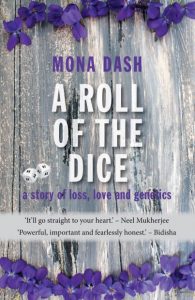A Roll Of The Dice
 A Roll of the Dice is about one woman’s wish to become a mother while knowing that she carries a gene that could seriously affect her unborn babies, particularly if they are boys. The memoir is a thrilling page-turner as well as a story of a haunting journey towards motherhood.
A Roll of the Dice is about one woman’s wish to become a mother while knowing that she carries a gene that could seriously affect her unborn babies, particularly if they are boys. The memoir is a thrilling page-turner as well as a story of a haunting journey towards motherhood.
Mona describes in riveting detail the ups and downs, the shocks and support, the false starts and real hopes. Her personal journey takes her from India to London to seek treatment at Great Ormond Street Hospital where SCID (Severe Combined Immuno-deficiency) is recognised and understood. Mona Dash writes her story of genetics roulette without self-pity, with astounding courage and even humour.
Many years ago, in India, I became the mother of a baby boy. My worries, like most women all across the world, centred around childcare, getting back to my pre-pregnancy weight, fitting back into my normal clothes, getting back to my busy job. Everything was fine, and I thought I was well in control. He was perfect, he fed well, he was healthy, he was even sleeping through out the night! I had a fantastic support system in place. I had done it. I was a mother.
However, my perfect baby started to show worrying signs of illness when he was four and a half months old. He developed a high fever and an unexplained rash all over his little body. As young parents, we were not prepared for something like this. Indeed, who is? After repeated visits to our paediatrician who was clueless, we visited a string of doctors, each one more highly paid than the other, each one with longer waiting lists and a greater reputation. We ran from pillar to post, desperate to find out what could be wrong. After two whole months of playing tag with doctors, we decided to leave Kolkata and go to a specialist hospital in South India in search of a diagnosis.
We were given a horrifying answer. In my genes is a devastating, fatal condition, SCID which has a fifty percent chance of being passed from mother to son. The outcome is as uncertain as a roll of the dice. SCID is so rare and complex that treatment is available in only a few countries across the world. ‘Leave this country if you want to save your child,’ the doctors in India told me.
Having faced one major shock, I assumed that what followed would be easier. But it wasn’t. My perfectly normal desire to become a mother involved a long medical and emotional journey, complete with rare acronyms and took me all the way from India to London. Along the way, I went through sorrow, fear and anger. It seemed so unfair that I was being denied something normal and natural. Why me? And then came the answer: Yes, you. It’s happened to you, so must go through it and emerge stronger. Somewhere along this boulder-strewn way, I found the courage to make a promise: Baby, you hold and I will hold on.
I am a writer of fiction and poetry. When I decided to write this as a memoir, and therefore a true story, there were questions, especially from family. Was it a good idea to bare so much of my personal life? Why not fictionalise it, invent characters, embellish the story?
There were two reasons I didn’t. One is that, as they say, truth is stranger than fiction. Critics would perhaps dismiss my story as improbable and unlikely to happen to one person! And the second, more pressing reason is that I really hope that this memoir – the only one written about SCID and other rare conditions such as PPROM – helps increase awareness of these medical conditions. I hope it makes someone else feel a little less alone. I hope it stresses the importance of new born screening for conditions such as SCID which, as of 2019, is mandatory in all states of America, but not yet in the UK where a pilot scheme is to be introduced this year. Professor Bobby Gaspar, who wrote the Introduction for this book, is leading a nation-wide trial for SCID screening.
A Roll of the Dice is a story of loss, love and genetics. It is also a story about medicine meeting miracles, and about overcoming challenges outside your control. It is a story with a happy ending but readers will have to wait to find out about that.
—
Excerpt of A ROLL OF THE DICE
 Section 1 – Rupture – FEAR
Section 1 – Rupture – FEAR
I could feel the fever climbing.
It was a Thursday, in October, in 2006, in my home in London. Nothing unusual about the day. I was exactly fourteen weeks and five days pregnant. I was working from home and planned to attend my body balance class in the evening. Inspired by the perfectly toned pregnant women who dexterously managed dancer and warrior poses, I was looking forward to completing the rest of my pregnancy in yogic perfection.
But by early evening, I was feeling feverish. While I normally wouldn’t care about a mild temperature, I knew I couldn’t, shouldn’t, take a risk. Giving up the vision of doing graceful Tai Chi moves with my baby bump, I settled on the sofa. I consoled myself that I could go the following week. As always my laptop was with me; a couple more emails to complete and then I would get something to eat and have an early night.
I could still feel the fever climbing.
The first trimester had been a worrying time for us because there had been some mild bleeding or ‘spotting’ from as early as six weeks. Several times I had been sent to the early scan unit in the local hospital but as the weeks passed, the episodes lessened, and at the milestone of fourteen weeks and five days, that Thursday, I was finally beginning to relax. I would breeze through the second trimester, supposedly a more peaceful, restful time.
I should explain what the early scan unit is. It sat not within but on the periphery of the maternity ward. Here they placed a little device on your stomach and checked the heartbeat, checked if there was a heartbeat, and either assured you of the viability of the pregnancy or advised you to give up on this one and try again. They gave you a picture of the scan, grey circles on black paper, and pointed at the bean shape embedded in the centre. They said, ‘Look, that’s the embryo, that’s your baby!’ or ‘Sorry, dear, but you can treasure this as a keepsake.’ There was a sense of desperation in the little waiting room and a dividing line between those who would lose their babies too early and those who would bear their children and their dreams. Cards and messages from parents covered the walls.
Every time I was scanned and heard the loud duk-duk-duk-duk inside me, a wide smile would flash on the nurse’s face. ‘Baby’s fine!’ I imagined writing a happy, flowery card to this kind, maternal-looking nurse in my second trimester.
I worked as a solution sales manager with travelling an integral, almost the main aspect of the job. Some days ago, I had taken a train and gone into the depths of High Wycombe for a meeting and in a coffee break had gone to the toilet only to find more of those dreaded little red spots. I could hardly concentrate for the rest of the meeting. The next day I was back in the early scan unit and thankfully the nurse said, ‘Baby’s fine.’ But I had to stop travelling until I reached the next milestone at the start of the second trimester when everything was meant to stabilise. So I had to tell my boss that I needed time off.
Mr. Smith, my gynaecologist, had established me on a daily dose of Clexane injections. One of his previous blood tests had shown a high factor of protein C. I didn’t quite know what that meant nor why I had developed it but these subcutaneous injections, given just under the skin, were necessary because otherwise I might be prone to miscarriage.
So I’d learnt to inject myself in the stomach every day. Keep your hand steady, place the needle against the skin of your stomach, pierce carefully at an angle making sure you are not puncturing a blood vessel. It’s easy, don’t worry, I told myself. After feeling the sharp prick, I carefully put away the used needle in the waste bin provided by the local surgery. The injections were to continue all through the pregnancy, a part of my routine – eat, brush teeth, inject, read, sleep. The bin stood next to my bed and filled up with sharps, like a time counter.
In a week, I was to have a special early gender scan in King’s College, London. The result – boy or girl – was crucial. Not just in one of those pink or blue nursery ways, not in an Asian ‘I must have a boy’ way, but in a far more crucial-to-life-itself way.
Because I could never forget what had happened before, six years earlier.
It was in the kitchen, that Thursday of the mounting fever, after I’d placed my plate in the sink, that it happened. A quick moment. No warning, no pain, no noise and suddenly a thick pool of colourless liquid at my feet. ‘Amniotic fluid’, I heard myself mumble. Even though I’d never seen it, I just knew. I stared at the gel-like liquid for a while, thick and unspreading on the floor and knew it was the fluid inside the uterus, the fluid that surrounds and protects the baby, essential to its development. Fragments from school Biology lessons flashed through my mind. I can’t remember now, was it my hand which reached for some kitchen towels and mopped up the liquid? Or did I rush to the bathroom first and then come back to clean the floor? Did I stare for seconds or minutes, looking at something from deep inside me out there in the open, something that until a moment ago was next to my baby? I don’t remember exactly what I did, but soon, trying to stay calm, I went back to my sofa and called my husband.
Published by Linen Press
Available on Amazon and Kindle and from Linen Press (https://www.linen-press.com/shop/a-roll-of-the-dice/)
—
Mona Dash writes fiction and poetry. Her work includes a novel, A Roll of the Dice (Linen Press 2019) Untamed Heart (Tara India Research Press 2016), and two collections of poetry, Dawn- Drops (Writer’s Workshop 2001) and A certain way (Skylark Publications 2017).
She has a Masters in Creative Writing (with distinction) from the London Metropolitan University. Mona was awarded a Poet of excellence award in the House of Lords in 2016. Her work has been anthologised and published widely and she has been listed in several competitions. her short story collection ‘Let us look elsewhere‘ was shortlisted for the SI Leeds Literary Prize 2018. Mona leads a double life; apart from being a writer, she is also a Telecoms Engineer with a MBA and works full time in a global technology organisation. Originally from India, she lives in London.
Social media:
Twitter : @dash2mona
Category: Contemporary Women Writers, On Writing


























Comments (1)
Trackback URL | Comments RSS Feed
Sites That Link to this Post